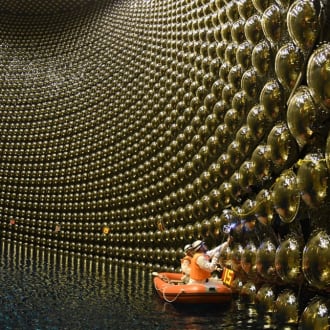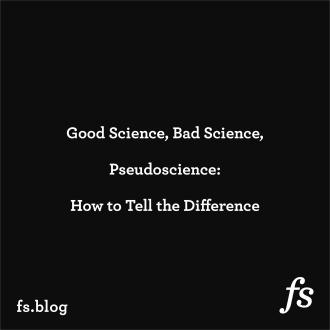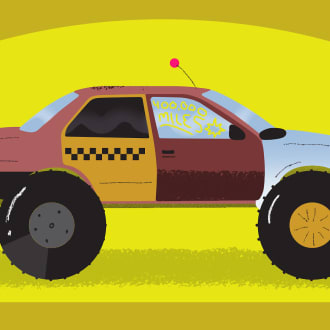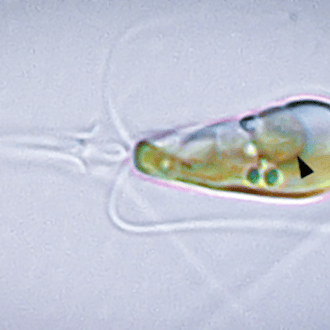
The Best Articles in Science
The most useful articles and videos in Science from around the web, curated by thought leaders and our community.
Refind focuses on timeless pieces and updates the list whenever new, must-read articles or videos are discovered.
Top 5 Science Articles
At a glance: these are the articles that have been most read, shared, and saved in Science by Refind users in 2024 so far.
Videos
Watch a video to get a quick overview.
Freezing time in your best years, not your end years
Age expert Dr. Morgan Levine explains why living to 100 is the wrong goal.Subscribe to Big Think on YouTube ► https://www.youtube.com/channel/UCvQECJukTDE2i6...
The science of super longevity
Science can’t stop aging, but it may be able to slow our epigenetic clocks.Subscribe to Big Think on YouTube ► https://www.youtube.com/channel/UCvQECJukTDE2i...
The Man Who Accidentally Killed The Most People In History
One scientist caused two environmental disasters and the deaths of millions. A part of this video is sponsored by Wren. Offset your carbon footprint on Wren:...
Einstein's equations and the enigma of wormholes
Quantum wormholes are mathematically possible — but might also be physically impossible. Physicist Janna Levin explains the wormhole paradox.This interview i...
Is consciousness an illusion? 5 experts explain
“If science aims to describe everything, how can it not describe the simple fact of our existence?” On this episode of Dispatches, Kmele speaks with the scie...
What is ...?
New to Science? These articles make an excellent introduction.
What Is a Neutrino? The Missing Key to Modern Physics Could Be a Ghost Particle
The enigmatic saga of one of astrophysics' most wanted particles.
What Is Entanglement and Why Is It Important?
Caltech scientists explain the strange phenomenon of quantum entanglement in everyday language.
What is Neural Network? How does it understand things?
One of our great scientists, Stephen Hawking, said that “The development of full Artificial intelligence could spell the end of the human...
How to ...?
How To Spot Bad Science
In a digital world that clamors for clicks, news is sensationalized, and “facts” change all the time, here’s how to discern what is trustworthy and what is hogwash.
«Science is not some big immovable mass. It is not infallible. It does not pretend to be able to explain everything or to know everything.»
How to Make the Universe Think for Us
Physicists are building neural networks out of vibrations, voltages and lasers, arguing that the future of computing lies in exploiting the universe’s complex physical behaviors.
How to break a theory
When a theory breaks, you learn how to build it better.
«ASK WEIRD QUESTIONS Einstein had a wild imagination. He asked himself questions like: What would he feel if he rode an elevator through outer space? What would he see if he chased a beam of light?»
How to see a memory
Every memory leaves its own imprint in the brain, and researchers are starting to work out what one looks like.
Trending
These links are currently making the rounds in Science on Refind.
Physicists Capture First-Ever Image of an Electron Crystal
The findings affirm a 90-year-old theory about how electrons can assemble without atoms.
Dark Energy Could Be Evolving Over Time, Raising Questions About the Nature of the Cosmos
The largest 3D map of the universe ever made hints that dark energy might not be a constant, though the findings must be backed up with more data
‘Mini liver’ will grow in person’s own lymph node in bold new trial
Biotechnology firm LyGenesis has injected donor cells into a person with liver failure for the first time.
Two lifeforms merge in once-in-a-billion-years evolutionary event
Last time this happened, Earth got plants.
13 recent scientific breakthroughs
From photos of the infant universe to an energy advancement that could save the planet
Short Articles
Short on time? Check out these useful short articles in Science—all under 10 minutes.
The "blind spot" in science that's fueling a crisis of meaning
Adapted from The Blind Spot: Why Science Cannot Ignore Human Experience by Adam Frank, Marcelo Gleiser, and Evan Thompson. Published by The MIT Press. Copyright 2024. All rights reserved.Our…
What Your Brain Is Doing When You’re Not Doing Anything
When your mind is wandering, your brain’s “default mode” network is active. Its discovery 20 years ago inspired a raft of research into networks of brain regions and how they interact with each other.
Can you trust your memory? This neuroscientist isn’t so sure
Science is full of drama. One century we’re basing the treatment of ailments on the four humors, then over two thousand years later, we find out it’s actually microbes messing with our bodies. For Dr…
Why Randomness Doesn't Feel Random
Most of us tend to think of randomness as being “well spaced." Genuinely random distributions seem to contradict our inherent ideas of what randomness should look like.
Invisible Landscapes
This essay is a companion piece to an episode of Radiolab, titled The Interstitium. You don’t need to have heard it for this essay to make sense, but
Long Articles
These are some of the most-read long-form articles in Science.
The Theorist Who Sees Math in Art, Music and Writing
The links between math, music and art have been explored for thousands of years. Sarah Hart is now turning a mathematical eye to literature.
What the Science Actually Says About Unconscious Decision Making
There is no free lunch when it comes to tricky decisions; you have to do the thinking.
«Albert Einstein once noted that “intuition is nothing but the outcome of earlier intellectual experience.”»
17 astounding scientific mysteries that researchers can’t yet solve
What is the universe made out of? How should we define death? Where did dogs come from? And more!
On the importance of staring directly into the sun
It's also important to poke the heart of a dead pigeon
«Most histories of psychology as an experimental science begin with Gustav Fechner setting up a psychophysical laboratory in the middle of the 1800s.»
66 Good News Stories You Didn't Hear About in 2023
A lot of things went right this year. Almost none of them made the news.
Thought Leaders
We monitor hundreds of thought leaders, influencers, and newsletters in Science, including:
What is Refind?
Every day Refind picks the most relevant links from around the web for you. Picking only a handful of links means focusing on what’s relevant and useful.
How does Refind curate?
It’s a mix of human and algorithmic curation, following a number of steps:
- We monitor 10k+ sources and 1k+ thought leaders on hundreds of topics—publications, blogs, news sites, newsletters, Substack, Medium, Twitter, etc.
- In addition, our users save links from around the web using our Save buttons and our extensions.
- Our algorithm processes 100k+ new links every day and uses external signals to find the most relevant ones, focusing on timeless pieces.
- Our community of active users gets the most relevant links every day, tailored to their interests. They provide feedback via implicit and explicit signals: open, read, listen, share, mark as read, read later, «More/less like this», etc.
- Our algorithm uses these internal signals to refine the selection.
- In addition, we have expert curators who manually curate niche topics.
The result: lists of the best and most useful articles on hundreds of topics.
How does Refind detect «timeless» pieces?
We focus on pieces with long shelf-lives—not news. We determine «timelessness» via a number of metrics, for example, the consumption pattern of links over time.
How many sources does Refind monitor?
We monitor 10k+ content sources on hundreds of topics—publications, blogs, news sites, newsletters, Substack, Medium, Twitter, etc.
Who are the thought leaders in Science?
We follow dozens of thought leaders in Science, including Richard Dawkins, Ben Goldacre, National Geographic, WIRED, NASA.
Missing a thought leader? Submit them here
Can I submit a link?
Indirectly, by using Refind and saving links from outside (e.g., via our extensions).
How can I report a problem?
When you’re logged-in, you can flag any link via the «More» (...) menu. You can also report problems via email to hello@refind.com
Who uses Refind?
450k+ smart people start their day with Refind. To learn something new. To get inspired. To move forward. Our apps have a 4.9/5 rating.
Is Refind free?
Yes, it’s free!
How can I sign up?
Head over to our homepage and sign up by email or with your Twitter or Google account.
Keep Learning
Get the big picture on your favorite topics.





















